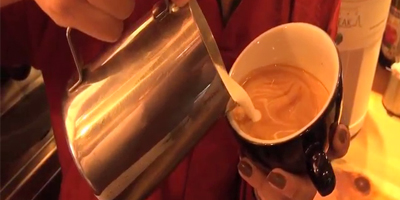
Nearly two decades after venturing into coffee farming, farmers in Samtse get a reliable market within the country. Mountain Cafe and Roastery in Paro has started buying their coffee cherries. This has revived their interest to grow coffee again.
One of the first coffee growers in Pemaling Gewog of Samtse is 50-year-old Mena Kumari Sarki. She started with 10 saplings in her backyard. Three years later when the plants started fruiting, there was no market. She had no idea how to make it edible either. And just like that, it went to waste every year.
“Last year I got over 40 kilograms of coffee beans but it all went to waste,” she said.
Like Mena, 42-year-old Tika Gurung is also among the many who saw coffee farming as an alternate source of income. She said growing coffee is easier than growing vegetables and other cash crops.
“Earlier our source of income is from selling orange but the yield had been depleting year by year, moreover, we lose most of it to the monkeys. Whereas only goats and cows eat the leaves of coffee. It is much easier to grow coffee for now,” she said.
Except for watering the plants during the dry season and adding some manure, she said the coffee farming doesn’t need much work.
Farmers in Pemaling Gewog received ten coffee saplings each in 2003. However, Tika Gurung said most of the farmers gave up taking care of the plant as there was no market even when the harvest was bountiful.
And for those who never gave up, they were not disappointed. The market for their coffee finally arrived in the form of a businessman from Paro. Last year he collected over 3,000 kilograms of coffee cherries from them.
“We harvest coffee beans starting October till February we can harvest it thrice in a year. “There are almost 200 families that have coffee plants. Some own five plants while some have in hundreds. I paid Nu 60 a kilogram,” Karma Chimi, the owner of Mountain Café in Paro.
 His love for coffee drove him to start the cafe in 2016 in Paro town. But the love story started turning bitter when the best brand of coffee failed to make his patrons happy. That is when he decided to produce his own coffee. He bought two acres of land in Samtse to grow coffee on large scale.
His love for coffee drove him to start the cafe in 2016 in Paro town. But the love story started turning bitter when the best brand of coffee failed to make his patrons happy. That is when he decided to produce his own coffee. He bought two acres of land in Samtse to grow coffee on large scale.
“I have constructed a nursery and raised over 20,000 coffee saplings. I sought state land on lease to transplant the coffee plants but I didn’t get the land. Then I supplied the saplings to the people assuring them that I would buy back the product in three years, as it starts fruiting in three years. We also made an agreement,” he said.
He took a loan of Nu 5.8 M from the CSI bank to purchase raw materials, procure machinery for roasting and packaging. Karma says if all goes well he will replace the imported coffee in the local market and also export.
“I have been getting orders and inquiries asking for coffee in bulk from abroad, unfortunately, I am not able to fulfil their orders and looks like I won’t be able to do that for the next three years. I am hopeful that after three years when my plants start fruiting I will be able to meet their demands. For now, I am not able to meet the local demand also. I am focusing on producing and branding organic coffee,” he said.
It is quite a journey to put a steaming cup of coffee on the table. And the excitement is more when the coffee on the table is roasted and brewed locally. There is a pride that the coffee you are sipping will not only help the farmers but will also contribute to the country’s economy.
Namgay Wangchuk, Paro
Edited by Sonam








